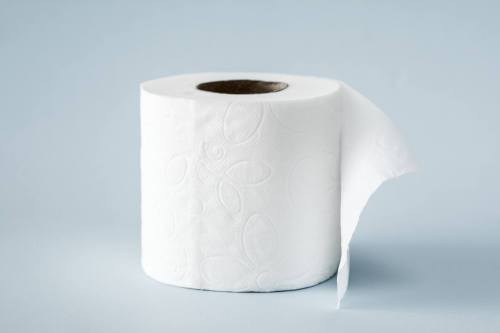“Everything comes down to poo,” J.D. and Turk once sang in the musical episode of Scrubs. They weren’t wrong—you can tell a lot about your health from your BMs. But for something that we all do on the regular, most people rarely ever talk about their poops openly. It’s not exactly the best brunch topic.
Admit it, there are definitely some major things about your poo that you’re dying to ask but are too embarrassed to bring up. Luckily for you, I went to the experts—the brave docs who have devoted their lives to the study of the gastrointestinal system—to get to the answers to the most common healthy poop questions they hear.
“I see chunks of food in my poop! Is this normal?”
“When you see undigested food, it’s most likely high-fiber vegetable matter—remnants of fiber we eat,” Samantha Nazareth, MD, NYC board-certified gastroenterologist, says. The most common culprit she sees during colonoscopies: corn, because our digestive system can’t break down the cellulose that makes up the outer hull.
And food in your stool isn’t necessarily a bad thing, adds Niket Sonpal, MD, adjunct assistant professor of clinical medicine at Touro College of Osteopathic Medicine. “When the GI tract is performing properly, it takes 24 to 36 hours for food to pass through your system,” he says. But: “If you see anything sooner than that or notice that your poop is [also] floating, oily, or giving you cramps, it could be a bigger issue like an autoimmune disease like irritable bowel syndrome or Celiac disease—or a problem with your body’s ability to absorb nutrients,” he explains. If you notice any of these symptoms, or find undigested food showing up in your stool regularly, you should see your physician.
“What should my poop smell like?”
Poop has its own unique, ahem, aroma. But surprisingly, Dr. Sonpal says that there is a “spectrum” about how intense that smell should be. If your poop smells really bad (like, clear out the bathroom, call the fire department disgusting) it’s likely due to malabsorption of nutrients, he explains. “Malabsorption occurs when your body is unable to absorb the proper amount of nutrients from the food you eat.” When those nutrients don’t get absorbed, they “rot like food you forgot in the back of your fridge,” says Dr. Sonpal—creating a particularly ripe smell. The most common culprits of malabsorption are Celiac disease, parasites, chronic pancreatitis, lactose intolerance, and food sensitivities—all conditions that impact your body’s ability to properly digest certain nutrients and foods. Definitely talk to your doctor about this, especially if you’re experiencing other symptoms of these conditions.
Some medications may also cause bad-smelling poop. “Many times medications are coated with indigestible sugars such as sorbitol which can ferment, cause gas and foul smelling stools,” Dr. Sonpal says. “If you note running to the bathroom after starting a new medication, it may be worth talking to your doctor about finding an alternative formulation.”
“Is it normal to see blood in my poop?”
Short answer: No. It likely is a symptom of a much bigger problem. “While most people chock up blood to some occasional bleeding hemorrhoids, there are more and more younger folks getting diagnosed with colon cancer,” Dr. Nazareth says—a symptom of which is a bloody BM. Blood in the stool is also a symptom of other serious health conditions like diverticulitis, polyps, or colitis. “See a gastroenterologist, please, before diagnosing yourself,” Dr. Nazareth says.
“Is there a ‘right’ way to poop?”
“Those folks at Squatty Potty got it right,” Dr. Nazareth says. Squatting—not sitting—is the best way to poop. That’s because you need to relax your puborectalis muscle, aka the muscle that controls your continence, in order to have a great poop. Being in a squatting position relaxes that pooping muscle and “unkinks” your colon, making for a more effective bowel movement.
“When should I start getting a colosocopy?”
Probably not for a while. “The USPSTF [a volunteer panel of experts aimed at making recommendations and increasing awareness around preventative health measures] recommends that screening for colorectal cancer start at age 50 years and continue until age 75 years,” Dr. Sonpal says. However, if you have a first-degree relative (like your mom or your brother) with colon cancer, then it’s recommended that you get a colonoscopy 10 years before the age that they were diagnosed or age 40, whichever comes first, he explains.
“Should I poop every day?”
Not necessarily. “Many people believe that having regular bowel movements means you move your bowels every day. However, everyone’s bowels are unique to them, and what’s normal for one person may not be normal for another,” Dr. Sonpal says. He notes that he has many patients come in worried that they’re constipated—but really, they’re regular.
“You can have a bowel movement anywhere from one to three times a day at the most, or three times a week at the least, and still be considered regular, as long as that’s your usual pattern,” he adds. If you poo less than that, it would be considered abnormal. If it becomes chronic, then it’s diagnosed as constipation.
“Above all else, I tell my patients that you want to make sure things are pretty similar from day to day. This shows you what is ‘normal’ poop frequency for your own body and clues you in to when something is off,” he says.
And there you have it. All your burning—er, perhaps “pressing” is a better word—poop questions, answered.
Do you talk about poop with your S.O.? A case for why you definitely should. And for even more poop content, here’s why you might be getting post-run poops.
Sign Up for Our Daily Newsletter
Get all the latest in wellness, trends, food, fitness, beauty, and more delivered right to your inbox.
Got it, you've been added to our email list.











